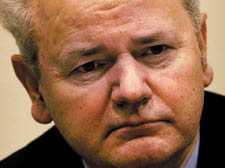
Slobodan Milosevic, whose trial ended when he died in March 2006 |
The trials of justice
Professor Bill Bowring separates the facts from the polemic in a readable study of the fate of Slobodan Milosevic
Travesty: the Trial of Slobodan Milosovic and the Corruption of International Justice. By Jack Laughland. Pluto Press £14.99 order this book
THERE are some indisputable facts about Slobodan Milosevic, as well as great controversy. John Laughland’s highly readable new book is written as a fierce polemic.
He condemns not only the trial, but also the war in Kosovo, the role of western states in establishing the International Criminal Tribunal for the Former Yugoslavia (ICTY), and the United Nations itself.
I agree with Laughland that the trial of Milosevic was a disaster, especially for the reputation of the ICTY. It was not a disaster for Milosevic, despite his death in custody. He ran rings around the prosecution and judges, and remade his image as a Serbian patriot, indeed, a hero.
I also agree that the war over Kosovo, which lasted from March 24 to June 10 1999, was illegal in international law, and that its supposed justification has now been largely discredited. The Kosovo Liberation Army (KLA) must take much of the blame for what happened in Kosovo.
There is evidence that the Nato allies committed war crimes during the conflict, as well as violations of the European Convention on Human Rights. I am one of many critics of the decision on June 2, 2000 by the ICTY prosecutor, Carla del Ponte, not to investigate Nato actions; and of the ruling of the European Court of Human Rights on December 12, 2001, in Bankovic vs Belgium and other Nato states, that complaints made by relatives of the civilian victims of the bombing of the RTS station in Belgrade were inadmissible.
It is best to start with the facts. Milosevic was in power for more than 10 years. He was president of three versions of Serbia, latterly the Federal Republic of Yugoslavia, from May 8, 1989 until he was forced from office on October 6, 2000. He was arrested on March 31, 2001 and was (probably illegally) transferred to The Hague on June 29, 2001.
The ICTY had already, on May 27, 1999, announced his indictment for crimes against humanity, and violations of the laws and customs of war, allegedly committed in Kosovo. This indictment, issued during the war in Kosovo, was amended and supplemented on four occasions, to include Croatia and Bosnia. Milosevic’s trial opened on February 12, 2002 and ended with his death on March 11, 2006. Sir Richard May, the judge who presided over the first stages of the trial had already died, on July 1, 2004.
So much for the facts. Laughland’s own approach to the facts is somewhat partial. I am a lawyer, while Laughland is not; but that does not absolve Laughland from the duty to get the law right, especially in a book about a trial.
He announces, on page two of his Introduction, that the Milosevic trial was “the longest criminal trial in history”. Not so. A quick Google search reveals that the McMartin Preschool Abuse Trial in the US lasted six years.
On page 47, Laughland shows that he has misunderstood the 1999 House of Lords Pinochet case.
He thinks there is some significance in the fact that the ruling was issued the same day as Nato started to bomb Serbia. He ignores the nature and significance of universal jurisdiction for certain crimes, especially torture.
This misunderstanding extends to the crime of genocide, and to state immunity. He later states that the 1977 Protocol Additional to the 1949 Geneva Conventions deals with internal armed conflict, that is, civil war. On the contrary: it deals with international armed conflicts. And then he states that “in a normal criminal trial, victims have no special rights whatsoever”. But this is only true of the common law legal systems. In European continental systems victims do have extensive rights.
More importantly, the reader of this book has no sense that Milosevic was other than an upstanding patriot and peace-maker. Then why did hundreds of thousands of demonstrators descend on Belgrade on October 5, 2000, and force Milosevic’s resignation?
Laughland admits that “no doubt Milosevic bears some political responsibility for what happened” in 1990 when Yugoslavia disintegrated. But that is as far as he will go in criticising the hero of his book. Milosevic’s repression and corruption are well established.
What is Laughland’s own standpoint? He accuses Milosevic’s opponents of an “anti-state ideology”. He wishes to defend “state sovereignty”. He condemns the Nazis for having “treated the concept of state sovereignty with contempt, saying it was but an artificial invention of bourgeois liberalism to obscure the biological unity of the European continent” – a strange judgment, especially when three times he cites none other than Carl Schmitt, the Nazis’ chief legal ideologist, though Laughland does not describe him as such.
Read this book – but with caution.
|